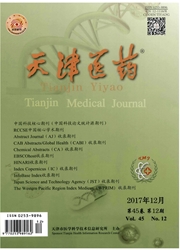

 中文摘要:
中文摘要:
目的探讨雌激素受体α(ERα)阳性的乳腺癌细胞中ERα对神经激肽受体-1截短型变异体(NK1R-Tr)的调控作用,以及ERα是否通过调控NK1R-Tr的表达,间接调控细胞的增殖能力。方法染色质免疫共沉淀(CHIP)实验验证ERα是否可以结合到NK1R-Tr启动子上游的ERα反应元件,直接调控NK1R-Tr的表达;荧光素酶报告基因实验验证ERα是否对NK1R-Tr的表达起正性调控作用。Westernblot实验和RT-PCR实验检测乳腺癌细胞系MCF-7和T47D的ERα和NK1R-Tr在蛋白水平和mRNA水平的表达情况;以及在ERα激动剂雌二醇(E2)刺激的条件下,小干扰RNA敲除ERα后,NK1R-Tr在不同水平的表达情况;小干扰RNA敲除NK1R-Tr后,CCK-8和克隆形成实验检测敲除NK1R-Tr的乳腺癌细胞的增殖能力。结果在NK1R-Tr基因启动子上游存在ERα的反应元件,ERα在E2存在条件下作用于该反应元件,对NK1R-Tr的表达起正性调控作用。同样在E2刺激的条件下,敲除乳腺癌细胞MCF-7内源性ERα后,NK1R-Tr在蛋白水平和mRNA水平的表达均下降;且敲除NK1R-Tr的MCF-7细胞增殖能力较未敲除组明显降低。结论在ERα阳性的乳腺癌细胞中,ERα正性调控NK1R-Tr的表达,从而增强细胞的增殖能力。
 英文摘要:
英文摘要:
To analyze the regulation of estrogen receptor α (ERα) on truncated neurokinin-1 receptor (NK1R-Tr), and the influence of this regulation on cell proliferation in estrogen receptor-positive breast cancer cell lines.Methods The chromatin immune coprecipitation (CHIP) was used to observe the transcriptional regulation function of ERαon NK1R- Tr in breast cancer cells. Luciferase reporter gene assay was used to verify whether ERα played a positiveregulatory role in the expression of NK1R-Tr. Western blot assay and real-time-PCR were used to detect the expression ofERα and NK1R-Tr in breast cancer cells, MCF-7 and T47D, as well as the expression of NK1R-Tr protein and mRNAlevel. NK1R-Tr levels were also detected after using estradiol (E2, ERα agonist) and small interfering RNA (knock outERα). CCK- 8 and clone formation experimen were used to detect the proliferation ability of breast cancer cells afterknocking out NK1R-Tr with small interfering RNAs. Results CHIP test and Luciferase reporter gene assay proved thatERα can positively regulate the expression of NK1R-Tr via the ERα sequences in the upstream of the NK1R-Tr genepromoter. The expression of NK1R-Tr at both protein level and mRNA level dropped in the estrogen receptor-positive breastcancer cell line MCF-7 upon knocking out ERα. After knocking out NK1R-Tr, the proliferation ability of estrogen receptorpositivebreast cancer cells was lower than that of the control group. Conclusion The ERα positively regulates the expression of NK1R-Tr, resulting in the increased cell proliferation in estrogen positive breast cancer cells.
 同期刊论文项目
同期刊论文项目
 同项目期刊论文
同项目期刊论文
 期刊信息
期刊信息
